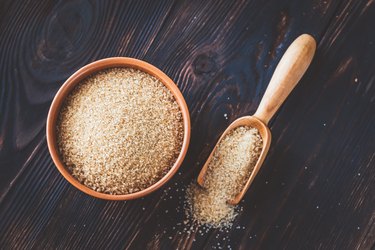
If you drink coffee or eat baked goods, there's a good chance you've come across turbinado sugar. That's because the large sugar crystals you see on top of your favorite blueberry muffin or the sugar in the raw packet you add to your morning cup of coffee is called turbinado sugar.
What Is Turbinado Sugar?
Video of the Day
According to the Sugar Association, turbinado sugar is a partially processed sugar sometimes known as raw cane sugar. It has a blond color but tastes like mild brown sugar. Because it is partially processed, it retains more of the naturally present molasses. The sugar crystals are larger than traditional brown sugar, which is why it's used more as a topping on baked goods rather than an ingredient in the recipe.
Video of the Day
When it comes to the sweet stuff, you might be wondering, "What's the healthiest sugar?" While sugar, in general, is not considered a health food, turbinado does have a reputation as the healthier sugar, especially when compared to refined white sugar.
That said, the research to back this up is partly based on an older study published in the January 2009 issue of the Journal of the Academy of Nutrition and Dietetics that found raw cane sugar, or turbinado, was higher in antioxidants than other sugars such as refined sugar. This led many to believe that raw sugar benefits were significantly higher than those of other forms of sugar.
According to USDA FoodData Central, 1 teaspoon of turbinado sugar has approximately 18 calories, 0 grams of protein, 0 grams of fat and 4.5 grams of carbohydrates. Other sugars have a similar nutrition profile. There are 16 calories in 1 teaspoon of granulated sugar and 17 calories in brown sugar, while 1 teaspoon of powdered sugar is slightly less with 10 calories.
Additionally, 1 teaspoon of turbinado sugar has 0.55 milligrams of calcium, 0.017 milligrams of iron, 0.092 milligrams of magnesium, 0.046 milligrams of phosphorus, 1.33 milligrams of potassium, 0.138 milligrams of sodium and trace amounts of zinc, copper and magnese.
Sugar in the Diet
When it comes to health-related concerns, naturally occurring sugar, which is sugar that is not added to food, is not the problem. The added sugars found in sodas, baked goods, breakfast cereals and other sweets wreak havoc on the body, according to the American Heart Association (AHA).
You can find naturally occurring sugars in foods such as fruit and milk, but this type of sugar is not necessarily the problem. It's the added sugars that seem to cause the most health problems for so many people. In fact, an April 2014 study published in JAMA Internal Medicine found that a sugar-laden diet may raise your risk of dying of heart disease even if you aren't overweight.
Read more: 15 Reasons to Kick Sugar
That's why the AHA has recommended that women consume less than 100 calories of added sugar per day or about 6 teaspoons, and men should consume less than 150 per day or about 9 teaspoons.
To stay within these guidelines, you may need to make dietary modifications. Whenever possible, try to avoid added sugar. If you're not sure how to get started with a reduced sugar diet, try a few of these tips from the Mayo Clinic.
- Cut up fresh fruit for desert instead of cookies, cakes and ice cream.
- Look for reduced-sugar options for foods like jelly, syrups, ketchup and other high-sugar condiments.
- Consume 100 percent fruit juice, not fruit juice with added sugars.
- Skip the sugary sodas, sports drinks and energy drinks and opt for water infused with fruit like lemon, oranges, watermelon and strawberries.
- Sugar Association: "Types of Sugar"
- Mayo Clinic: "Added Sugars: Don't Get Sabotaged by Sweeteners"
- Journal of the Academy of Nutrition and Dietetics: "Total Antioxidant Content of Alternatives to Refined Sugar"
- USDA FoodData Central: "Turbinado Sugar"
- American Heart Association: "Sugar 101"
- JAMA Internal Medicine: "Added Sugar Intake and Cardiovascular Diseases Mortality Among US Adults"
- United States Department of Agriculture: "Granulated Sugar"
- United States Department of Agriculture: "Brown Sugar"
- United States Department of Agriculture: "Powdered Sugar"